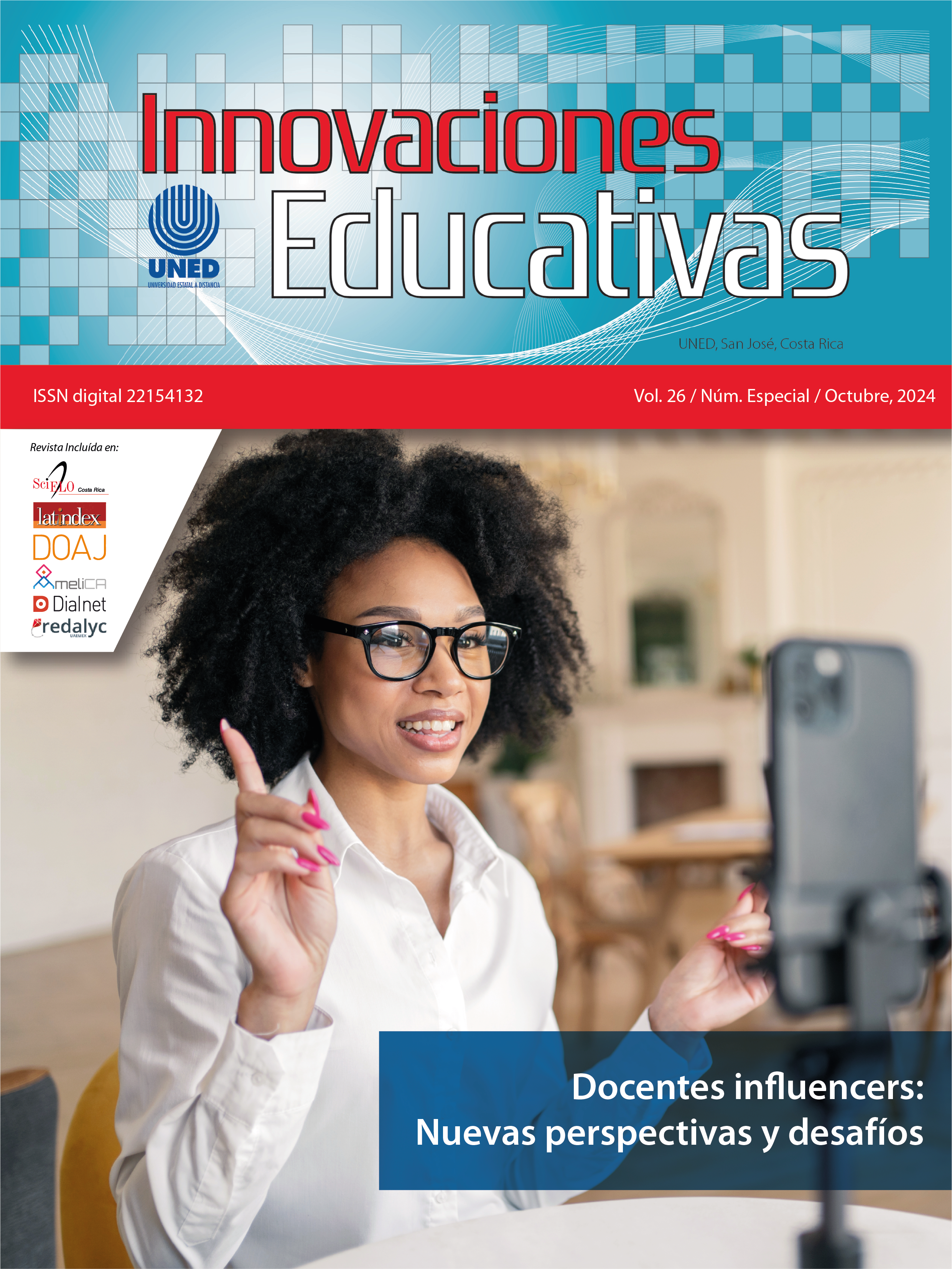The Professional Profile of the University Professor as an Educational Influencer: Students' Voices
DOI:
https://doi.org/10.22458/ie.v26iEspecial.5380Keywords:
Qualitative Analysis, Higher Education, University Student, Professor Influence, University ProfessorAbstract
This research project deals with the characteristics that a university professor must have in order to be considered an educational influencer from the perspective of Generation Z students. The study population consists of third year students of Office Administration and Business Education at the Professional Secretarial School of the Faculty of Social Sciences of the National University of Costa Rica. The students completed an interview to obtain empirical information and to know the opinion of each participant, guaranteeing their anonymity. The methodological approach used in this study is qualitative and the method employed was phenomenological, which aims to describe the meaning of the experiences lived by each student interviewed. The results of this research demonstrate the multifaceted nature of the university educator as an influencer, who must have a balance between technical knowledge, soft skills, a deep commitment to the teaching and learning process, supported by digital technologies and social networks, in order to contribute to the integral formation of the student body. It is concluded that the student body highlights intrinsic and personal characteristics of the university professor influencer, such as motivation, empathy, patience and passion for teaching, as well as knowledge and pedagogical mediation, aspects that go beyond a presence in social networks.
References
Abarca, F. (2016). La mediación pedagógica en la docencia universitaria. Editorial Universidad Nacional.
Audrezet, A., Kerviler, G. y Moulard, J. G. (2018). Authenticity under threat: When social media influencers need to go beyond self-presentation. Journal of Business Research, 117, 557-569. https://doi.org/10.1016/j.jbusres.2018.07.008
Ballestín, B. y Fábregues, S. (2018). La práctica de la investigación cualitativa en ciencias sociales y de la educación. Editorial UOC.
Bazarra, L. y Casanova, O. (2019). Influencers educativos: ¿Como transformarnos en adultos inspiracionales? Ediciones SM.
Bisquerra, R. y Mateo, J. (2019). Competencias emocionales para un cambio de paradigma en educación. Horsori Editorial.
Camacho, C. (2018). Visión Teórica Humanística Educativa de la Generación Z 3.0 en Tiempos Complejos. Revista Scientific, 3(9), 20-38. https://doi.org/10.29394/Scientific.issn.2542-2987.2018.3.9.1.20-38
Carpenter, J. P., Shelton, C. S. y Schroeder, S. E. (2022). The education influencer: A new player in the educator professional landscape. Journal of Research on Technology in Education, 1-16. https://doi.org/10.1080/15391523.2022.2030267.
Coloma-Arguello, M. J., Castillo-Armijos, M. A. y Sarango-Medina, Y. M. (2023). Aplicación de Metodologías Activas para el Aprendizaje en Educación General Básica. Ciencia Latina Revista Científica Multidisciplinar, 7(6), 3590-3604. https://doi.org/10.37811/cl_rcm.v7i6.8940
Davis, S. y Yi, J. (2022). Double tap, double trouble: Instagram, teachers, and profit. E-Learning and Digital Media, 19(3), 320-339. https://doi.org/10.1177/20427530211064706
Dengo, M.E. (1992). Suplemento Día del Educador. Periódico La República.
Garbizo-Flores, N., Ordaz-Hernández, M. y Lezcano Gil, A. M. (2020). El profesor universitario ante el reto de educar: Su formación integral desde la responsabilidad social universitaria. REXE. Revista de Estudios y Experiencias en Educación, 19(40), 151-168. https://doi.org/10.21703/rexe.20201940garbizo8
Gibbs, G. (2012). El análisis de datos cualitativos en Investigación Cualitativa. Ediciones Morata, S.L.
Godoy-Oliveros, A. (2024). El contenido de los mensajes de los influencers educativos en Instagram. EDUCA International Journal, 1(4) 17-35, https://doi.org/10.55040/educa.v4i1.81
Grenny, J. Patterson, K. y McMillan, R. (2020). Influencer: la nueva ciencia de liderar el cambio (2a ed.). McGraw-Hill España.
Guerra-Báez, S. (2019). Una revisión panorámica al entrenamiento de las habilidades blandas en estudiantes universitarios. Psicología Escolar e Educacional, 23, 1-11. http://dx.doi.org/10.1590/2175-35392019016464
Gutiérrez, F. y Prieto, D. (1993). La mediación pedagógica: Apuntes para una educación a distancia alternativa (2 ª ed.). Universidad de San Carlos de Guatemala.
Hernández-Sampieri, R. y Mendoza-Torres, C. P. (2018). Metodología de la investigación: Las rutas cuantitativa, cualitativa y mixta. McGraw-Hill Education.
Hernández Sampieri, R., Fernández Collado, C. y Baptista Lucio, P. (2014). Metodología de la investigación (6ª ed.). McGraw Hill Education.
Jan-Frederik G. y Annika G. (2018). Good KPI, Good Influencer? Evaluating Success Metrics for Social Media Influencers. En Proceedings of the 9th International Conference on social media and Society (SMSociety '18). Association for Computing Machinery, New York, NY, USA, 291–295. https://doi.org/10.1145/3217804.3217931
Ortega, I. (2017). Generación Z: El dilema. Deusto Business School.
Pérez-Escoda, A., Castro-Zubizarreta, A. y Fandos-Igado, M. (2016). La competencia digital de la Generación Z: claves para su introducción curricular en la Educación Primaria. Revista Científica de Educomunicación, XXIV(49), 71-80. https://doi.org/10.3916/C49-2016-07
Ruíz, M. (2021). ¿Cómo aprendemos? Una aproximación científica al aprendizaje y la enseñanza. ISTF
Naciones Unidas. (2018). La Agenda 2030 y los Objetivos de Desarrollo Sostenible: una oportunidad para América Latina y el Caribe [LC/G.2681-P/Rev.3]. CEPAL, Naciones Unidas. https://bit.ly/3QqaYho
Marcelo, P. (2020). Educational Influencers – What can we Learn from them? Enhancing the Human Experience of Learning with Technology: New challenges for research into digital, open, distance & networked education. En European Distance and E-Learning Network (EDEN) Conference Proceedings. http://dx.doi.org/10.38069/edenconf-2020-rw-0036
Martín-Casado, T. G. (2021). Influencers masculinos versus influencers femeninas en la infancia: contenidos con creatividades y estereotipos diferenciados por género. En J. Sotelo y N. Abudín (Eds.), Comunicar en pandemia: de las" fake news" a la sostenibilidad (pp. 413-436). Graw Hill. https://dialnet.unirioja.es/servlet/articulo?codigo=8186698
Maxwell, J. (2019). Diseño de investigación cualitativa. Editorial Gedisa.
Sanabria, P., Chacón, A., Linares, S. y Salas, R. (2017). La Verdad sobre las Generaciones en Costa Rica #Gentico. Yulök Revista de Innovación Académica, 1(1), 18- 35.
Seemiller, C. y Grace, M. (2016). Generation Z Goes to College. Jossey-Bass.
Téber, L. (2003). El perfil del profesor mediador. Aula XXI. Santillana.
UNESCO. (2020). Enseñanza inclusiva: preparar a todos los docentes para enseñar a todos los alumnos. https://unesdoc.unesco.org/ark:/48223/pf0000374447_spa
UNIMER Centroamérica. (2016). Costa Rica Social 2016. https://unimercentroamerica.com/costa-rica-social-2016
Universidad Nacional. (2015). Estatuto Orgánico de la Universidad Nacional. https://bit.ly/3FJs9Wo
Vázquez-González, L., Clara-Zafra, M., Céspedes-Gallegos, S., Ceja-Romay, S. y Pacheco-López, E. (2022). Estudio sobre habilidades blandas en estudiantes universitarios: el caso del TECNM Campus Coatzacoalcos. IPSA Scientia, revista científica multidisciplinaria, 7(1), 10-25. https://doi.org/10.25214/27114406.1311
Verd, J. y Lozares, C. (2016). Introducción a la investigación cualitativa. Fases, métodos y técnicas. Editorial Síntesis, S.A.
Downloads
Published
How to Cite
Issue
Section
License
Copyright (c) 2024 Innovaciones Educativas

This work is licensed under a Creative Commons Attribution-NonCommercial-NoDerivatives 4.0 International License.

